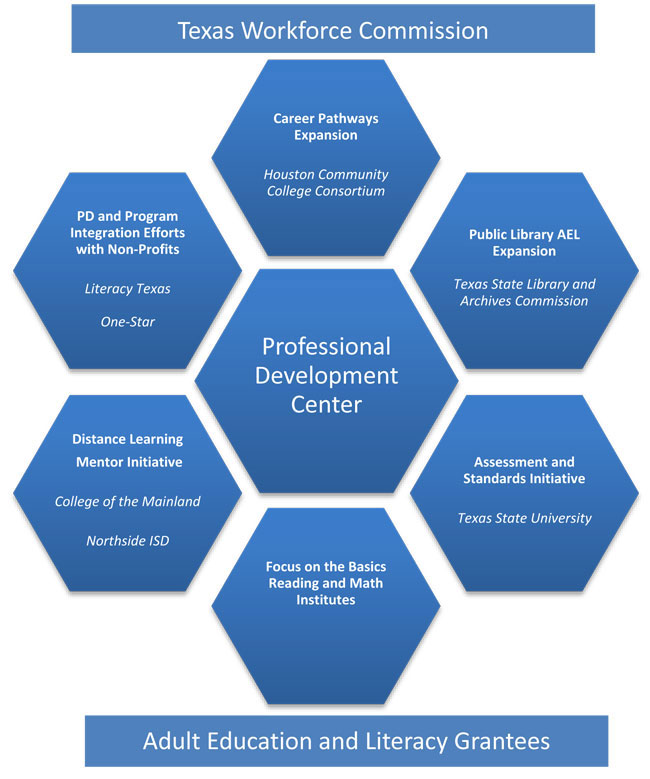TRAIN Tex: Training, Resources and Innovation Network for Texas
This is the ARCHIVED 2014 Version. This 2014 Paper Describes the Original TRAIN Tex Model. |
||||||||||||||||||||||||||||||
|
||||||||||||||||||||||||||||||
The Training, Resource and Innovation Network for Texas (TRAIN Tex) strategy represents the Texas Workforce Commission’s (TWC) significant investment in professional development (PD), relevant research, and capacity-building projects that can sustain and advance a robust system of Adult Education and Literacy (AEL) providers and workforce partners to accelerate the advancement of education and training priorities across the state. These priorities support successful education and workforce transitions for individuals, families, and communities in Texas. The value of Adult Education and Literacy in Texas has never been greater. Local AEL providers already implement innovative student service delivery options that include hallmark career pathways, workforce services and distance education models. Texas has an unprecedented opportunity to fully deploy an Adult Education and Literacy system that transforms the limited legacy options of the past into a high quality, fully integrated network of AEL providers, workforce training systems, and the state’s Workforce Solutions services. Purpose Texas' highly integrated workforce development system leverages Texas Workforce Solutions, vocational rehabilitation, and various other state and federal workforce development programs to implement system enhancements. These enhancements are strategically designed to continue strengthening the state's workforce development system and put more Texans into living wage jobs and careers, to spur skills and credential attainment, employment retention, and career advancement, resulting in a higher quality workforce, reduced dependency on public assistance, increased productivity and competition across Texas. The Context for Innovation AEL providers in Texas serve over 180,000 individuals annually through federally- funded, state-funded, and community-based nonprofit instructional providers. Of these providers, TWC AEL Grantees serve over 100,000 students and provide a range of services from basic literacy through preparation for the Texas Certificate of High School Equivalency. Services have been expanded to include career pathways programs integrated with workforce training, programs at employer’s worksites, family literacy, and programs that prepare immigrants for work and civic life in America. Other state-funded programs, including libraries and correctional institutions like the Windham School District and the Texas Juvenile Justice Department, provide basic literacy services and English language instruction. Community- and faith-based organizations also provide tutoring and basic literacy services, largely delivered by volunteers. TWC has established a milestone of enrolling 20,000 adult learners in career pathways programs by the year 2020, and has placed a priority on programs that enroll participants in career pathways and workforce and college transition programs. Local providers have eagerly embraced this bold career pathways milestone. Preliminary enrollments for Program Year 2015–2016 indicate a 277 percent increase in career pathways and transitions program enrollments when compared to the same period in the last program year. While enrollments are rapidly increasing, Texas has challenging work ahead to meet the milestone of 20,000 learners and to fully integrate Adult Education and Literacy into the workforce development system. Texas must continue to innovate, develop, and deliver professional development that will expand these quickly evolving models and support the integration of Workforce Solutions, developmental education, and workforce training partners, which are vital to successful career pathways. The Future Under TWC leadership, a shared responsibility among AEL Grantees, capacity building projects, and the PD Center promises to deliver responsive, best-in-class program support through curriculum and standards development, cutting-edge professional development training, comprehensive resource development, and program mentoring. Service delivery solutions are informed by performance data analysis and an understanding of local community and employer needs, and the leveraging of shared resources. Related investments in the 28 Local Workforce Development Boards and local workforce planning requirements under WIOA are identifying additional areas where capacity- building, training, and integration strategies are needed. The TRAIN Tex strategy distributes responsibilities across three entities, each one directed and supported by TWC AEL staff:
|
||||||||||||||||||||||||||||||
As of January 2016, the PD Center has produced the following outcomes: Table 1: PD Center Outcomes
|
||||||||||||||||||||||||||||||
Summary
The resulting interconnected system is built on objectives derived from TWC direction, stakeholder feedback, and a continuous review of AEL system performance and research. |
||||||||||||||||||||||||||||||
Table 2: Activities of TRAIN Tex Entities
|
||||||||||||||||||||||||||||||
Figure 1
|
||||||||||||||||||||||||||||||
Links: Capacity Building Projects Footnotes: (1) Federal programs include:
State-funded workforce development programs include:
|

